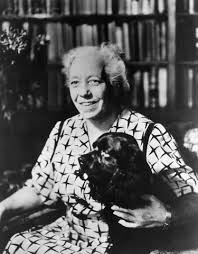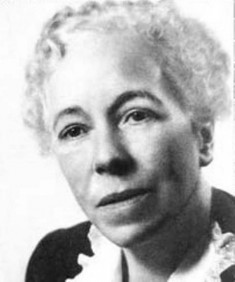Karen Horney was a famous German psychoanalyst. Her theories questioned some traditional Freudian views, especially her theories of sexuality and the instinct orientation of psychoanalysis. Horney is credited with founding Feminist Psychology, which was in response to Freud’s theory of penis envy. She traced her differences to society and culture instead of biology. Due to this, she is often classified as Neo-Freudian.
Early Life
Karen Horney was born on September 16, 1885, in Blankenese, Germany. Her father was a devoutly religious ship’s captain and her mother was the opposite, being more open-minded than he was. Karen described her father as a cruel disciplinary figure who held his son, Berndt, in higher regard than her. Despite that, her father often brought her gifts from far away countries.
When Karen Horney turned nine years old, she changed her perspective of life and became very ambitious and rebellious. She felt she could not become pretty and therefore, she focused her attention to her intellectual qualities. As a young woman, she suffered the first of several bouts of depression.
Schooling Years
In 1904, Karen’s mother left her father, taking Karen with her. In 1906, Karen joined a medical school. Her mother supported this decision while her father was against it. By 1908, Karen had already transferred to the University of Gottingen and later to the University of Berlin. She graduated in 1913. While still at the university, she met Oskar Horney, whom she later married in 1909. In 1910, she gave birth to her first child. By this time, she had already developed interests in psychoanalysis.
Career in Psychology
In 1920, Karen Horney was offered a position at the Institute for Psychoanalysis in Berlin. She lectured on psychoanalysis for several years. She also taught in New York at the New School. Her husband, Oscar, developed meningitis and soon he developed an embittered, morose, and augmentative attitude.
In 1923, her brother died of a pulmonary infection. These two events contributed to the worsening of Karen’s mental health. In 1926, together with her daughters, she left Oscar’s house and four years later, she moved to the U.S. She soon settled in Brooklyn where she met Erich Fromm and Harry Sullivan.
Her first job in the U.S was as the Associate Director of the Chicago Institute for Psychoanalysis. During her stay in Brooklyn, she developed her theories of neurosis and personality. This was based on her experience working in psychotherapy.
Theory of Neurosis
 Karen looked at neurosis in a very different light from other psychoanalysts of her time. She believed neurosis was a continuous process with neuroses occurring sporadically in a person’s lifetime. This was in contrast to other psychoanalysts who believed a neurosis was like a severe mental condition in response to external stimuli, such as divorce or very negative experiences during childhood.
Karen looked at neurosis in a very different light from other psychoanalysts of her time. She believed neurosis was a continuous process with neuroses occurring sporadically in a person’s lifetime. This was in contrast to other psychoanalysts who believed a neurosis was like a severe mental condition in response to external stimuli, such as divorce or very negative experiences during childhood.
From her experience as a psychiatrist, Karen listed 10 patterns of neurotic needs. The needs are based upon things that she thought all humans require to succeed in life. She modified the needs to correspond with what she believed were a person’s neuroses. According to Horney, a neurotic person could theoretically exhibit all these needs. However, in practice, fewer than 10 on the list are needed for a person to be considered a neurotic.
Horney as a Neo-Freudian
Together with Alfred Adler, Karen Horney formed the Neo-Freudian discipline. While she agreed and acknowledged with Freud on many issues, she was also critical of him on several beliefs. Karen felt that sex and aggression were not primary constituents for determining a person’s personality.
On the topic of penis envy, Karen believed that men were envious of a woman’s ability to bear children. The degree to which men chase success may be to substitute to the fact that they can’t carry, nurture, and bear children, according to Horney.
Feminine Psychology
Karen was also a pioneer in the discipline of feminine psychology. She was the first woman to present a paper about the topic, but she also wrote 14 papers between 1922 and 1937 and combined them into a single volume called Feminine Psychology. As a lady, Karen always felt that mapping trends in female behavior was a neglected issue.
Horney’s Theory of Self
Karen Horney believed that if we have an accurate conception of own self, then we can be free to realize our potential and achieve whatever we wish within some reasonable boundaries. Therefore, she believed self-actualization is the healthy person’s goal in life. This is opposed to the neurotic’s clinging to a certain set of key needs.
Death and Legacy
Karen Horney died on December 4, 1952, at the age of 67 in New York City. In 1955, the Karen Horney Clinic was opened in the same city as her death in honor of her work and achievements. The clinic is designed to help train professionals going into the psychiatry field and its purpose is also to provide low-cost treatment to those who need it.
